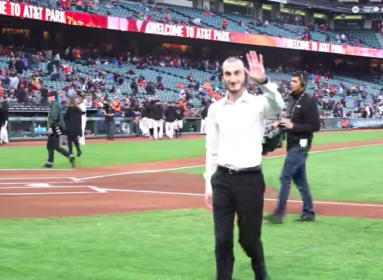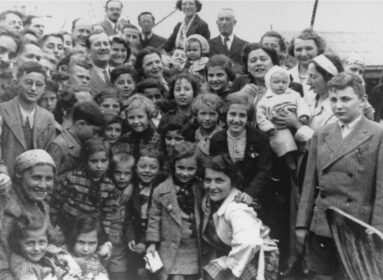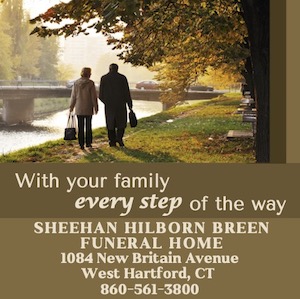Jonathan Green joins the family business
By Cindy Mindell
FAIRFIELD – Sixty-five years after Abraham L. Green opened Fairfield County’s first funeral home to serve the Jewish community, his grandson Jonathan has become a funeral director with the family business.
The funeral home, Abraham L. Green and Son, is run by Sam Green, who followed in his father’s footsteps in 1978. Now Sam’s son, Jonathan, is doing the same.
A graduate of Ezra Academy in Woodbridge and Hopkins School in New Haven, Jonathan earned a BA in sociology from Ithaca College in 2009, the same year he became a licensed Emergency Medical Technician. After completing an internship in social work, he went on to graduate studies in the field at Kutztown University of Pennsylvania.
After a year, he knew that he wanted to find a different way to help people. “I was so set on being a social worker that I had no clue what to do once that turned out to not be the case,” Jonathan says. So he came home to work alongside his father, Sam, and soon realized that he was on the right path.
Six months later, he entered the American Academy McAllister Institute of Funeral Service in Manhattan, graduating last May summa cum laude and receiving the Faculty Award and the Award of Merit from the New York State Funeral Directors Association. He completed an apprenticeship and passed the national and state exams, officially becoming licensed in Connecticut last month.
While Green’s is a family business, each successive generation has been allowed to decide whether to be part of it or not, says Sam. Jonathan is the third in line who started out on his professional path with other ideas.
Abraham Green, born in New Haven to Jewish immigrants from Eastern Europe, was studying to be a rabbi at a Cincinnati yeshiva when the U.S. entered World War II. He served as a medic’s assistant on the front lines of Europe and returned to New Haven when the Bridgeport Jewish community was looking for someone to open a funeral home. He decided to enroll in mortuary school, commuting to the American Academy of Embalming and Mortuary Research in New York before it merged with the McAllister School of Embalming.
He learned Jewish funeral and burial customs from friend and colleague Bob Shure, founder and director of Robert E. Shure Funeral Home in New Haven, then opened A.L. Green Funeral Home on Grand Street in Bridgeport in 1948. His wife, Minnie, became a licensed funeral director in 1952.
Sam was involved in his parents’ business by high school, providing transportation for local and visiting chevra kadisha members as soon as he had his driver’s license. (Literally, “holy society,” a chevra kadisha is a group of Jewish men and women who prepare Jewish bodies for burial in accordance with Jewish tradition.)
After graduating from high school, he entered cantorial college, but decided instead to study aircraft maintenance in Boston. He switched again, this time to his father’s profession, and graduated from the American Academy McAllister Institute of Funeral Service in 1978.
“Most people in the funeral profession don’t jump right in,” Sam says. “It’s experiential and you have to try it and then make a decision.”
Sam joined the business, and Abraham added “and Son” to the shingle. By the late ‘80s, Jewish Bridgeport had largely dispersed to the surrounding suburbs, and Sam began looking for an alternative location for the funeral home. After 10 years of zoning snags, the rabbis of Greater Bridgeport and a local Episcopal priest rallied in support of Green’s current location, a former sea captain’s house on Beach Road in Fairfield, built in 1850. After a renovation process, the doors opened in 1998.
Jonathan says that he grew up accustomed to the 24/7 life of the funeral director, where many family dinners were interrupted by phone calls from the bereaved in the Greens’ care. “Even when you’re away, you’re still on call and available to the community,” Sam says of his approach to the business, where, as a public servant, he sometimes has to put his own family’s plans second.
Both Sam and Jonathan say that their impact is in the small things that seem unnavigable to someone in mourning. “Because you’re going through an emotional process, it’s the day-to-day planning we normally take for granted that becomes difficult, and the little things we help people with make the impact,” Sam says, citing as examples, “how to get from point A to point B, whether someone should drive themselves that day, how to contact people. And then there are the bigger decisions – what’s right for me, my family, and my loved one – decisions that people haven’t made before or if they have, still have to navigate.”
Does a funeral director approach life with more gusto or respect?
Jonathan says no, but, “Not because of what I do and how I grew up, with my father and grandfather’s history, but because of the way I personally live, I find it more fulfilling to take risks and enjoy life,” he says. “Not dangerous risks, but say I want to do something, I’m not going to think, ‘Is bungee-jumping the last thing I’ll do?’ I don’t stop and think, ‘I’m a funeral director, I need to take a second.’ Because I’m at the funeral home, my work is concerned with death and the finality of life. But I hear about how people’s loved ones lived life and that’s very inspiring. That’s what I will focus on.”
Comments? email cindym@jewishledger.com.








 Southern New England Jewish Ledger
Southern New England Jewish Ledger











